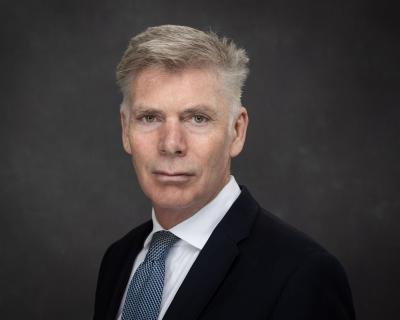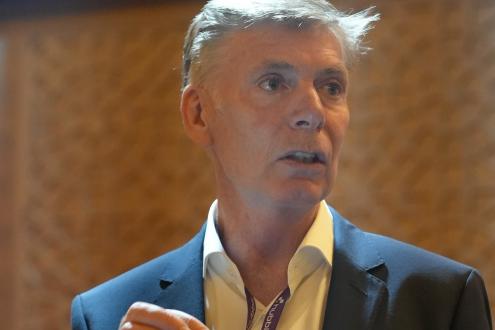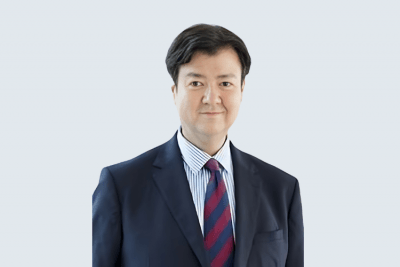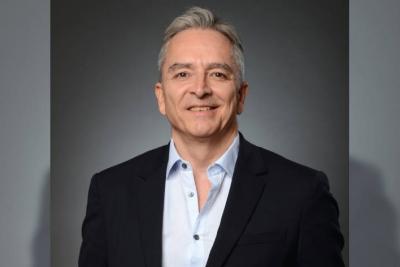Wealth Solutions & Wealth Planning
How Wealth Managers Should Weigh Up the Value Proposition of the Investment Platform and Wealth Service Providers

Oct 16, 2023
Nicholas Wright, Regional Head of Institutional Business (MENA) for Saxo Bank, has some clear insights when it comes to the value propositions that wealth managers need and indeed increasingly expect from external investment platforms and service providers. He told guests at the Hubbis Wealth Solutions Forum in Dubai on September 20 that any such providers to the wealth industry must be mindful of global trends, regional themes and local nuances. He said that the first priority must be to help the wealth managers deliver preservation of wealth and robust investment advice for their own private clients, but aligned with that the firms must provide a very broad range of products, combined with the optimal digital tools to help the wealth managers deliver their own top quality, responsive service to their private clients.
Working with and for the wealth industry
To launch his Workshop on September 20, Nicholas advised delegates that his role at Saxo is working with partners such as were represented in the room at the event, namely private and other banks, external asset managers, single- and multi-family offices, and others in the wealth management industry. He explained that his Workshop was designed to look at their needs and how they should look at those businesses – such as Saxo – that provide an investment platform and other services.
“Nothing in our industry is becoming simpler or more straightforward,” he told delegates. “But hopefully, my presentation will help somewhat demystify what you as wealth managers should look for when selecting a platform or a service provider.” And he reminded the audience that his big-picture mission was obviously to communicate how and why he believes Saxo is the ideal partner for the wealth community.
Seeking a value-added proposition
Armed with an easy-to-absorb slide show, Nicholas noted that there are four key components that define value for this segment: safety of assets, availability of products, a good set of tools and excellent customer service.
The degree of importance of each component may differ for each client, so finding the right provider that matches the client’s expectations will ultimately result in trust gained.
Nicholas added that in the wealth management business, you need to be working with partners that deliver win-win scenarios for all concerned. “Good deals are not short-term wins for one or another party, but the coming together of different parties to collaborate in win-win scenarios for everyone involved,” he states.
With that, he drilled down into what he thinks should make a good partner and a good partnership. He highlighted what he called the ‘Iron Triangle’ to explain that the providers must deliver the right quality and breadth of products and the right service on time, efficiently, and at the right price.
Growth aplenty
Nicholas then offered delegates some insights into the evolution of the wealth management market. He reported that MENA wealth growth defied global trends in 2022 with the UAE attracting the second most millionaires in the world in 2022, behind Australia. He explained that UAE wealth is set to grow on a CAGR basis by 5.5%, hitting 1.3 trillion by 2027. He noted that local capital markets in the region had been maturing, with IPOs up more than 55% in 2022, led by Saudi Arabia.
“And there is a clear trend for HNW and UHNW capital coming back to be booked here in MENA, rather than in traditional centres in Europe, for example,” he told guests. “That is really another big positive for MENA markets.”
Opportunities galore
Although growth in the region is impressive and likely to continue apace, Nicholas did note that wealth management penetration of the various sectors from mass affluent upwards was lagging well behind other more developed markets. “But that means huge opportunities ahead,” he stated.
“As the wealth industry develops here, there is a huge upside to increasing the percentage of clients that actually use wealth products.”
He returned to his thesis around the four key criteria for choosing a wealth platform: safety of assets, availability of products, a good set of tools to access the products and services, and excellent customer service with top-flight digital and human connectivity.
“All of these elements coming together combine to create trust between the parties, and that is what holds these relationships together,” he commented.
Err on the side of caution
Nicholas then highlighted how safety and security are not quite as easy to identify in difficult market conditions. He noted how 2023 alone had seen three of the largest bank failures in US history.
He said you cannot rely just on brand and reputation, and the developed world is coming out of the 2011-2021 decade of low inflation, low interest rates, and many financial institutions are struggling to adapt to the brave new world.
“We have moved now into an inflationary, high-rate, high volatility cycle, so beware as you choose platforms and partners, as financial strength and robust balance sheets and smart risk management are needed. In short, conducting your due diligence on the banks, brokers or custodians has never been more important.”
Changing expectations
He moved on to products and asset allocation, noting recent publications by GIC and Goldman Sachs Asset Management the expectations of returns from the classic 60% equity and 40% fixed income allocation model should be adjusted downwards as compared to the past decade of low interest rates.
Instead, adding greater global diversity and multiple asset class diversification will help create a more macro-resilient portfolio, potentially improving returns and reducing risk at the same time.
This means that clients are looking for a greater array of investment products, markets, and asset classes. But of course, with greater choice comes more complexity, and with that, additional costs to the wealth manager and client to obtain these products from various providers. Therefore, it has become even more important today to find partners that provide access to as wide an array of asset classes, thereby minimising the operational costs of establishing and maintaining multiple relationships.
“In short,” Nicholas summarised, “you need a provider that can give you a platform and not increase complexity or costs, but give you that ability to navigate your partner's portfolios through difficult times, efficiently and cost-effectively.”
At your service…
He moved on to the delivery of these products and services, remarking that aside from the provider offering the necessary diversity of products, they must be delivered seamlessly and efficiently.
Wealth managers need to be able to transact cash, securities or other investments without an onerous administrative burden. They want to access platforms and online tools to manage their clients' portfolios efficiently, seamlessly and without administrative or reporting problems.
Moreover, the process from the outset must be user-friendly. The troubles over onboarding, KYC and AML in the wealth industry are legendary, so a rapid, smooth and even quite pleasant onboarding experience is essential in today’s world of onerous regulation and compliance.
The evolving client topography
Nicholas also highlighted how the client base is evolving, as the next and younger generations – many of them digital natives – are either inheriting trillions of dollars of private wealth or making the world’s future wealth.
“The wealth industry is going to evolve dramatically in the next 20 years, as the largest transfer of wealth happens, with estimates of up to USD100 trillion of money transitioning in the next 25 years!” he told guests. “And who will benefit most from this ‘inheritocracy’ as I call it? The Zillennials, or rather the millennials and Gen Z. And they are digital savvy, they care much more about social environment and governance, and women will be a far larger proportion of the client base than ever before, and they are relatively underserved so far by the wealth community.”
Additionally, Nicholas reported that the makeup of the market is shifting enormously, as the mass affluent grows dramatically and will account for USD45 billion in wealth revenues by 2026, or roughly 60% of the entire fee pool in the wealth industry.
“Realistically, the mass affluent market is the biggest opportunity out there, and they will have assets anywhere between a few hundred thousand and several million dollars equivalent,” he explained. “But remember, the mass affluent has been difficult to cover because they are not of the scale to have dedicated RMs, so you need the best technologies and tools and practices to win and retain them as clients.”
Nicholas expanded on the vital qualities that wealth managers should seek in their providers, from seamless onboarding of all types of clients and entities to complete mutual visibility between the advisors, RMs and clients in terms of products, ideas, advice, transactions, execution, reporting and consolidated views of the clients’ entire portfolios and holdings.
Beating the law of averages
He closed his Workshop with some insights into why he and colleagues believe Saxo represents such a good partner for the wealth management community. “I believe we beat the law of averages in that we deliver the key criteria so vitally needed for the wealth industry - fast, high quality and competitively priced.
Moreover, Saxo runs a very conservative risk management framework with a strong balance sheet in all aspects, including having a much higher Tier 1 adjusted capital ratio than the average US or European bank. Saxo has been in business for more than three decades and offers a great diversity of products and assets that are needed for modern wealth managers’ needs. The firm is also constantly improving its comprehensive array of platforms and digital tools for wealth managers to easily onboard, transact, manage portfolios and service their end clients.
Saxo’s proposition
He concluded that it is the combination of safety, products, technology and service that makes Saxo what he believes is a uniquely compelling provider in the wealth management space.
“I am not telling anyone we have everything 100% perfect and nailed down,” he states, “but I am saying we are very strong financially and conservatively managed, we are a multi-asset house that never stops expanding the range we offer, and we understand the market and our customers, and we make every effort to support the industry and to deliver the top-quality service.”
Saxo – A Snapshot
Founded in 1992 in Copenhagen, Saxo was one of the first financial institutions to provide private investors with the same online trading tools and market access as professional traders, large institutions, and fund managers. Saxo combines an agile FinTech mindset with close to 30 years of experience and an outstanding track record in global capital markets to deliver a state-of-the-art experience to clients.
Clients across the world entrust over over USD100 billion in assets to Saxo. The company has more than 2,500 financial and technology professionals serving clients around the world including local teams in Singapore, Shanghai, Hong Kong, Tokyo, London, Zurich, Paris, Dubai, and Amsterdam.
The Saxo Bank Group holds four banking licenses and is well regulated globally across 16 offices. Saxo offers clients around the world broad access to global capital markets across asset classes, where they can trade more than 40,000 instruments in over twenty-five languages from one single margin account. The Saxo Bank Group also powers more than 135 financial institutions as partners by boosting the investment experience they can offer their clients via its open banking technology.
Saxo Bank first opened its doors in the UAE in 2009. As a provider of multi-asset trading and investment, Saxo’s vision is to enable people to fulfil their financial aspirations and make an impact. Saxo’s user-friendly and personalised platform experience gives investors exactly what they need, when they need it, no matter if they want to actively trade global markets or invest in their future.
Want to get involved in future events? Save the date of our Hubbis Wealth Solutions Forum – Dubai 2024, which takes place on Wednesday 11th September.
You may also wish to save the date of our other Wealth Solutions Forums taking place in 2024 –
- The Hubbis HNW Insurance Summit – Dubai which takes place on Wednesday 1st May 2024.
- The Hubbis Wealth Solutions Forum – Singapore which takes place on Wednesday 5th June 2024.
- The Hubbis HNW Insurance Summit – Singapore which takes place on Wednesday 4th September 2024.
- The Hubbis Wealth Solutions Forum – Hong Kong which takes place on Wednesday 23rd October 2024.
Want to find out more about how you can drive your connectivity within the wealth management industry in Asia and the Middle East? Get in touch at [email protected] to find out our Partnership Opportunities for 2024.

Regional Head of Institutional Business at Saxo

More from Nicholas Wright, Saxo
Latest Articles






